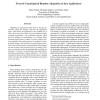Free Online Productivity Tools
i2Speak
i2Symbol
i2OCR
iTex2Img
iWeb2Print
iWeb2Shot
i2Type
iPdf2Split
iPdf2Merge
i2Bopomofo
i2Arabic
i2Style
i2Image
i2PDF
iLatex2Rtf
Sci2ools
108
click to vote
APSEC
2008
IEEE
2008
IEEE
Towards Unanticipated Runtime Adaptation of Java Applications
Modifying an application usually means to stop the application, apply the changes, and start the application again. That means, the application is not available for at least a short time period. This is not acceptable for highly available applications. One reasonable approach which faces the problem of unavailability is to change highly available applications at runtime. To allow extensive runtime adaptation the application must be enabled for unanticipated changes even of already executed program parts. This is due to the fact that it is not predictable what changes become necessary and when they have to be applied. Since Java is commonly used for developing highly available applications, we discuss its shortcomings and opportunities regarding unanticipated runtime adaptation. We present an approach based on Java HotSwap and object wrapping which overcomes the identified shortcomings and evaluate it in a case study.
APSEC 2008 | Available Applications | Extensive Runtime Adaptation | Runtime Adaptation | Software Engineering |
Related Content
| Added | 29 May 2010 |
| Updated | 29 May 2010 |
| Type | Conference |
| Year | 2008 |
| Where | APSEC |
| Authors | Mario Pukall, Christian Kästner, Gunter Saake |
Comments (0)

